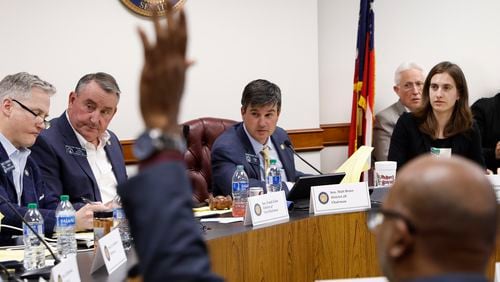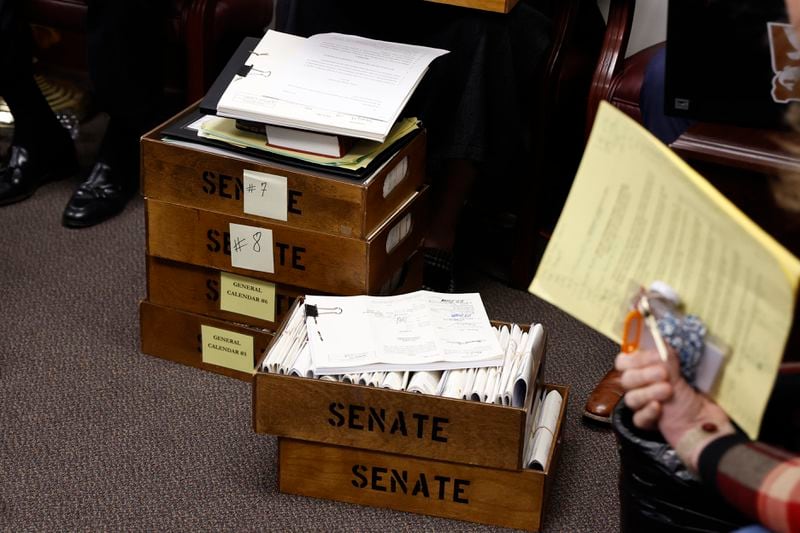Frazzled-looking state lawmakers, lobbyists and staff stuffed themselves into a fourth-floor Capitol committee room on Monday, each eagerly waiting to see whether his or her bills would clear the hurdle that lands them on the Senate calendar for the closing days of the 2024 session.
People spilled into the hall outside Room 450, poring over the 13-page document that let them know whether the measures they were pushing were even up for consideration by the Senate Rules Committee.
Each chamber’s Rules Committee becomes increasingly important as the speeding train that is the legislative session heads to a stop — scheduled to adjourn late Thursday — because it is in charge of selecting the bills that get debated and have a chance of passing. This year’s final meeting is even moreso as lawmakers close out the second year of the two-year cycle of a legislative session.
Shortly after concluding Monday’s meeting, Senate Rules Chairman Matt Brass, a Newnan Republican, scheduled another meeting for early Tuesday, likely after getting feedback that a high-priority bill was left off the list.
A typical late-session Rules Committee scene goes like this: Brass calls an anxious lawmaker to the podium to present his or her bill — or bills.
Sometimes a lawmaker only presents a single bill: “I just have one bill for you today and even I’m surprised by that,” state Rep. Trey Kelley said before launching into his spiel. Others, such as state Rep. Rob Leverett, have a list of bills they are sponsoring, causing Brass to quip, “Somebody must like you over there.”
And some lawmakers ignore the fact that their bill isn’t on the list of measures to be considered, known in the building as the “yellow sheet,” and make their pitches anyway.
“I had a bill that passed out of (Senate) Judiciary unanimously that’s not on the list that would update the first-offender code — can I talk about that one?” state Rep. Leesa Hagan said.
“You can,” Brass said.
It was not one of those selected for the Senate floor.
Credit: Natrice Miller/AJC
Credit: Natrice Miller/AJC
Brass is wrapping up his first biennium in this role, replacing former Chairman Jeff Mullis, who retired two years ago.
“You’ve got every author of every bill that’s (passed a committee) stop me in the hallways, at lunch and call me on the weekends,” he said. “But, to them, their bills are the most important bills. Unfortunately, the committee has to pick (bills), and we’ve only got so much bandwidth. And so it was tough because you’re having to tell your friends ‘no.’ ”
Once the dust settled, the 19 committee members emerged from their meeting having placed about 75 bills and resolutions up for debate during the final two days of the legislative session. More could be added Tuesday.
It wouldn’t be a legislative session without at least some of the most important or controversial bills going down to the wire. Purposeful procrastination is as much a part of lawmaking at the Capitol as lobbyists picking up the check for lunch and dinner.
And lawmakers, lobbyists and reporters have to keep a keen eye, as the last days of session are the times of “gut and replace,” when bills are “amended” as a way to push an issue that had no way forward. Many times the description of the bill does not in any way describe what the particular piece of legislation does.









